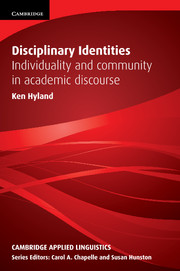Book contents
- Frontmatter
- Contents
- Series editors’ preface
- Preface
- Acknowledgements
- Notes on corpora and abbreviations
- 1 Identity: Interaction and community
- 2 Discipline: Proximity and positioning
- 3 Investigating identity
- 4 Identity in representational genres
- 5 Self-representation in academic bios
- 6 Culture: Authority and visibility
- 7 Reputation: Individuality and conformity
- 8 Gender: Disciplinarity and positioning
- 9 Identity, disciplinarity and methodology
- Appendix: Items with potential metadiscourse functions
- References
- Name Index
- Subject Index
7 - Reputation: Individuality and conformity
Published online by Cambridge University Press: 09 February 2023
- Frontmatter
- Contents
- Series editors’ preface
- Preface
- Acknowledgements
- Notes on corpora and abbreviations
- 1 Identity: Interaction and community
- 2 Discipline: Proximity and positioning
- 3 Investigating identity
- 4 Identity in representational genres
- 5 Self-representation in academic bios
- 6 Culture: Authority and visibility
- 7 Reputation: Individuality and conformity
- 8 Gender: Disciplinarity and positioning
- 9 Identity, disciplinarity and methodology
- Appendix: Items with potential metadiscourse functions
- References
- Name Index
- Subject Index
Summary
In this chapter I return to the issue of positioning and proximity, agency and conformity, in academic writing and the ways that consistent patterns of language choices work to realise a coherent and consistent individual identity. I have argued that identity is, above everything, social, and that identity can be seen as a framework through which we seek to unify our processes of creating meaning while participating in social communities. The idea of positioning is key here as it seeks to emphasise the importance of the discoursal repertoires that writers bring to an act of writing and which shape their understanding of proximity. These repertoires are influenced by their prior interactional experiences with texts in a range of contexts. Every word we write, therefore, represents a meeting of our subjective sense of a solid and continuing self and the many roles we play as part of our various memberships. Our writing is an encounter, possibly a struggle, between our multiple past experiences and the demands of the current context.
The production of texts is always the production of self, but negotiating a representation of self from the standardising conventions of disciplinary discourses is clearly a skilled accomplishment, involving both recognising and exploiting community constraints. This is the tension between positioning and proximity. While individual agency is not eliminated by the cultural authority of convention and the editing of disciplinary gatekeepers, it may be established figures in the disciplines, rather than novices, students or journeymen, who have the confidence and expertise to find ways to express a distinctive identity. In this chapter I move away from my focus on proximity in previous chapters to look at positioning and to explore how disciplinary experts exploit rhetorical options. I do this by interrogating the published work of two leading figures in applied linguists, Deborah Cameron and John Swales, and comparing these texts with mainstream work in the field. The research suggests how personal proclivities can contribute to an independent creativity shaped by shared practices.
- Type
- Chapter
- Information
- Disciplinary IdentitiesIndividuality and Community in Academic Discourse, pp. 147 - 169Publisher: Cambridge University PressPrint publication year: 2012



